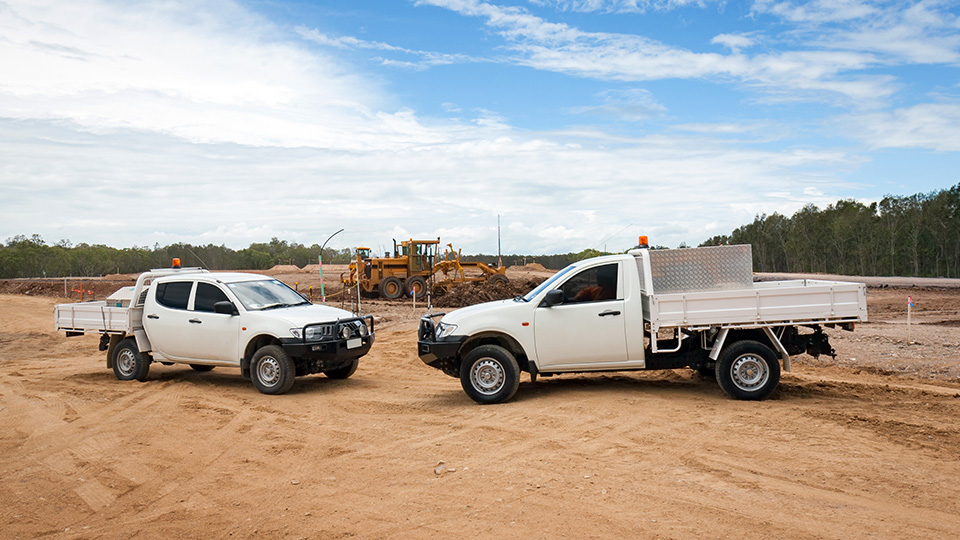November 19, 2019
Are work vehicles exempt from Fringe Benefits Tax (FBT)?

Tradespeople often receive a ute, van or other vehicle as an employee benefit, however this can attract Fringe Benefits Tax (FBT) when structured incorrectly.
The rules around FBT can appear complicated on the surface, so the Australian Taxation Office (ATO) recently issued compliance guidance to make it easier to understand for employers.
The provision of a workhorse vehicle can be exempt from FBT if:
- the vehicle is an eligible vehicle; and
- its private use is restricted to work-related travel and any other private use is minor, infrequent and irregular.
So which vehicles are eligible for the FBT exemption and what is considered as limited private use?
What are eligible vehicles for Fringe Benefits Tax (FBT) purposes?
Taxis, panel vans and utility trucks/single cab utes are considered eligible vehicles.
Other vehicles are eligible when they are designed to carry a load of one tonne (nine passengers) or more or when they are not designed for the main purpose of carrying passengers.
Dual cab utes that have less than one tonne capacity are only eligible when they are not designed for the principal purpose of carrying passengers. When determining if a car with a carrying capacity of less than one tonne is principally designed for carrying passengers, the number of passengers (including the driver) is multiplied by 68 kilograms.
This figure is then expressed as a percentage of the net carrying capacity of the car (gross vehicle mass, less kerb side weight) and if it is 50 per cent or less, the car is not considered principally designed for carrying passengers and may be eligible for the exemption.
What is considered as limited private use?
To provide more clarity in the matter, the ATO has released ‘safe harbour’ guidelines. These are the conditions required to access the safe harbour provided under the guidelines:
- An eligible vehicle is provided to a current employee;
- The vehicle is provided to the employee to perform their work duties;
- The vehicle had a GST-inclusive value less than the luxury car threshold at the time the vehicle was acquired (for 2019-20 the threshold is $75,526 for fuel-efficient vehicles and $67,525 for other vehicles);
- The vehicle is not provided as part of a salary packaging arrangement and the employee cannot elect to receive additional remuneration in lieu of the use of the vehicle;
- A formal policy is in place that limits private use of the vehicle, and assurance is obtained from the employee that their use is limited to use as outlined in point (6) and (7) below;
- The employee uses the vehicle to travel between their home and their place of work, and any diversion adds no more than two kilometres to the ordinary length of that trip; and
- For journeys undertaken for a wholly private purpose (other than travel between home and a place of work), the employee does not use the vehicle to travel more than 1,000 kilometres in total for the FBT year, or a return journey that exceeds 200 kilometres.
The ATO sets out that a written confirmation such as an email from an employee, which provides an assurance that any private use is limited as outlined point 6 and 7 above, is sufficient.
Are the guidelines compulsory?
It’s not compulsory to apply these guidelines. However, there is no need to keep records about the use of vehicles by employees when an employer chooses to rely on the guidelines. The ATO will also not review an employer’s car-related exemption treatment under these conditions.
In practice, it may be difficult to meet these guidelines. For example, if a vehicle is provided to an employee who has no other vehicle, it may be difficult to limit private use to no more than 1,000 kilometres each year.
If you need help navigating these guidelines or structuring your business to make the most of the FBT exemptions, LDB Group can help.
At LDB, we offer a range of experts and services to oversee your tax and compliance, business advisory, superannuation and finance needs.
If you have any questions about the FBT exemption, please call (03) 9875 2900 or send us details via the contact form below.





